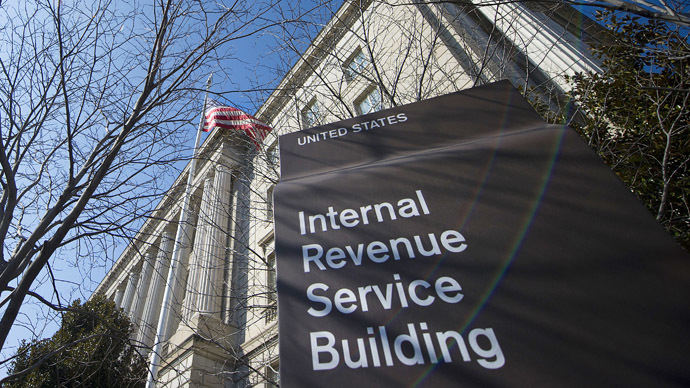IRS seizes hundreds of perfectly legal bank accounts, refuses to give money back

The Internal Revenue Service has been seizing bank accounts belonging to small businesses and individuals who regularly made deposits of less than $10,000, but broke no laws. And the government is refusing to return all the money taken.
The practice ‒ called civil asset forfeiture ‒ allows IRS agents to seize property they suspect of being tied to a crime, even if no charges are filed, and their agency is allowed to keep a share of whatever is forfeited, the New York Times reported. It’s designed to catch drug traffickers, racketeers and terrorists by tracking cash deposits under $10,000, which is the threshold for when banks are federally required to report activity to the IRS under the Bank Secrecy Act.
It is not illegal to deposit less than $10,000 in cash, unless it is specifically done to avoid triggering the federal reporting requirement, known as structuring. Thus, banks are required to report any suspicious transactions to authorities, including patterns of deposits below that threshold.
“Of course, these patterns are also exhibited by small businesses like bodegas and family restaurants whose cash-on-hand is only insured up to $10,000, and whose owners are wary of what would be lost in the case of a robbery or a fire,” the Examiner noted.
Carole Hinders, a victim of civil asset forfeiture, owns a cash-only Mexican restaurant in Iowa. Last year, the IRS seized her checking account ‒ and the nearly $33,000 in it. She told the Times she did not know of the federal reporting requirement for suspicious transactions, and that she thought she was doing everyone a favor by reducing their paperwork.
“My mom had told me if you keep your deposits under $10,000, the bank avoids paperwork,” she said. “I didn’t actually think it had anything to do with the I.R.S.”
And her bank wasn’t allowed to tell her that her habits could be reported to the government. If customers ask about structuring their deposits, banks are allowed to give them a federal pamphlet. “We’re not allowed to tell them anything,” JoLynn Van Steenwyk, the fraud and security manager for Hinders’ bank, told the Times.

Last year, banks filed more than 700,000 suspicious activity reports, according to the Times. The median amount seized by the IRS. was $34,000, according to an analysis by the Institute for Justice, while legal costs can easily mount to $20,000 or more, meaning most account owners can’t afford to fight the government for their money.
“They’re going after people who are really not criminals,” David Smith, a former federal prosecutor who is now a forfeiture expert and lawyer in Virginia, told the Times. “They’re middle-class citizens who have never had any trouble with the law.”
Rick Ungar wrote that the practice “amounts to nothing short of grand larceny on the part of the Internal Revenue Service” in an article for Forbes.
The Civil Asset Forfeiture Reform Act of 2000 came about after a Supreme Court case, Ratzlaf v. US (510 US 135 (1994)), in which the government argued that because “structuring is not the kind of activity that an ordinary person would engage in innocently,” it was therefore “reasonable to hold a structurer responsible for evading the reporting requirements without the need to prove specific knowledge that such evasion is unlawful.” But the Court rejected that argument, citing the lawful actions of small businesses to reduce the risk of an IRS audit.
Congress, believing that the decision “would make it harder to find and to prosecute money launderers and drug dealers,” according to the Washington Post blog the Volokh Conspiracy. The legislature then removed the word “wilfully” from the previous law about civil asset forfeiture, “leaving us with the mess we now have.”
The Institute for Justice, a Washington-based public interest law firm that is seeking to reform civil forfeiture practices, analyzed structuring data from the IRS, which made 639 seizures in 2012, up from 114 in 2005, the Times reported. Only one in five was prosecuted as a criminal structuring case.
“Think about that— a full eighty percent of the bank accounts emptied by the IRS in 2012 involved completely innocent people and businesses,” Ungar wrote. “How is that not a criminal enterprise?”

Most victims of civil asset forfeiture settle with the government for only a small portion of what was seized from them.
Army Sgt. Jeff Cortazzo of Arlington, Va., wanted to deposit cash for his daughters’ college education, but wanted to avoid paying a second round of taxes on the money. He asked the bank teller what to do.
“She said: ‘Oh, that’s easy. You just have to deposit less than $10,000’,” he told the Times.
The government seized $66,000 from the sergeant; he lost $21,000 of his money in the settlement with the IRS. “As a result, the eldest of his three daughters had to delay college by a year,” the Times noted.
“The IRS ‘accidentally’ takes your money and when you ask for it back, they try to keep a portion of it,” Ungar wrote. “How does that not have the odor of extortion?”
For his part, Cortazzo would have done things differently if he’d known his account could have been seized. “I would have just plopped the whole thing in the account and been done with it,” he said.
The IRS announced in a written statement Thursday that it will “no longer pursue the seizure and forfeiture of funds associated solely with ‘legal source’ structuring cases unless there are exceptional circumstances justifying the seizure and forfeiture and the case has been approved at the director of field operations (D.F.O.) level.”
But Richard Weber, the chief of Criminal Investigation at the tax agency, noted in the statement that structuring is still a crime, regardless of source and that the new policy will not apply to past seizures. “The policy involving seizure and forfeiture in ‘illegal source’ structuring cases will remain the same,” he noted.














